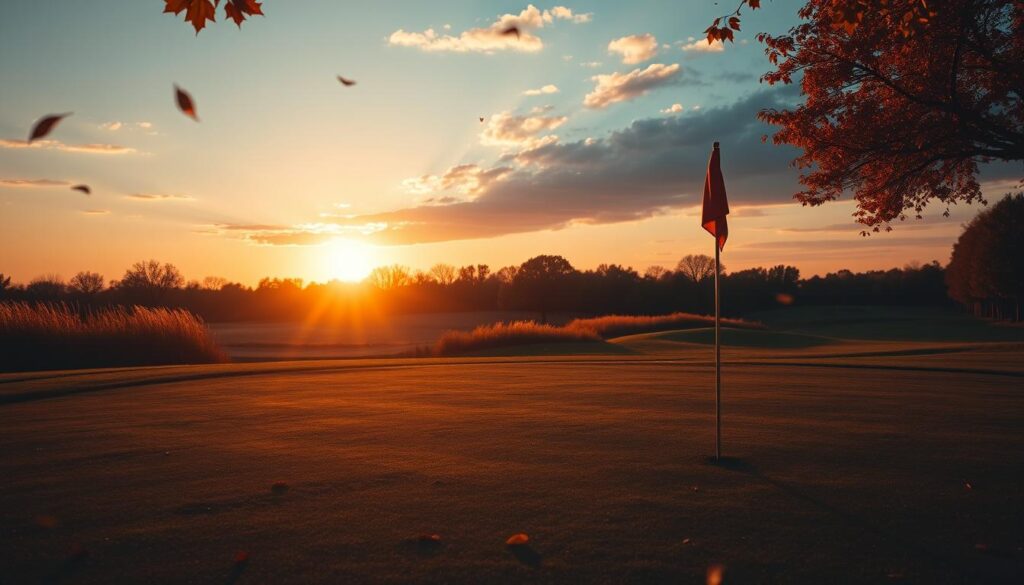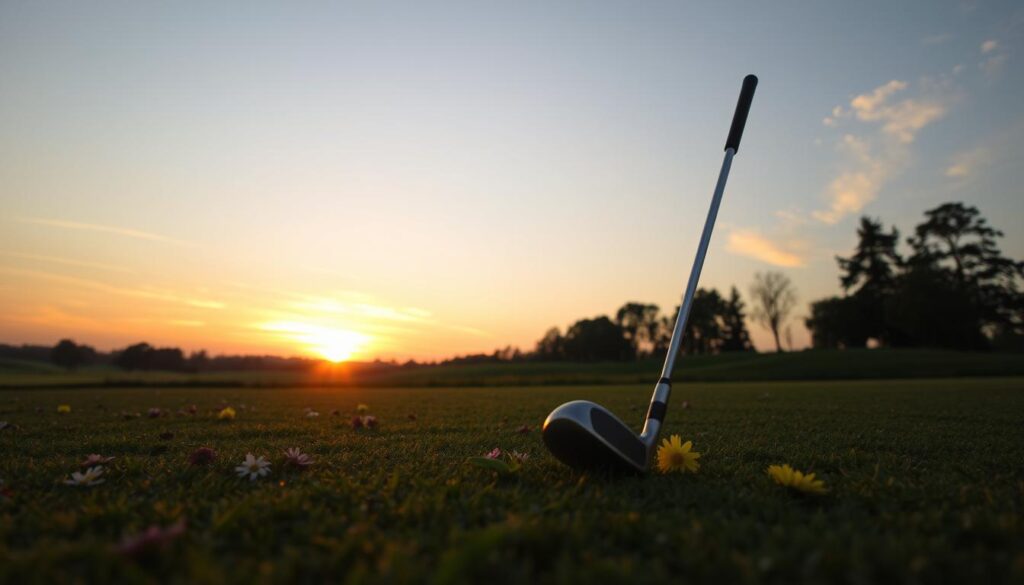Grieving a golfer can bring deep feelings that touch our hearts and bring people together. This loss goes beyond just numbers. It shows how we connect through shared golf experiences. When we remember a golfer, we keep their spirit alive by thinking of the good times we had.
The game of golf creates special bonds among players. These bonds help us honor and remember those we’ve lost. This process is not just about sadness. It’s also a way to heal together through our love for golf. By doing this, we celebrate the golfer’s life and support each other.
Table of Contents
ToggleKey Takeaways
- Grieving a golfer impacts both individuals and communities.
- The bonds formed in golf help to remember and honor those lost.
- Memories shared in the golfing community foster emotional healing.
- The legacy of a golfer can inspire future generations.
- Loss in sports evokes strong emotions that unify communities.
The Impact of Loss on Athletes
When athletes lose fellow competitors, mentors, or friends, it hits hard. This grief affects both their personal and professional lives. They may feel sad, confused, and lost, making it hard to cope with their loss in sports. Many athletes experience this during their careers, changing how they view life and sports.
Emotional and Psychological Effects
Loss leads to many emotional struggles for athletes. They might feel powerless, angry, or deeply sad. These feelings can mess with their focus and drive, impacting training and competition. Overcoming these losses requires support from others and inner strength.
- Grief can manifest as:
- Depression
- Irritability
- Social withdrawal
- Physical symptoms such as fatigue or anxiety
- Athletes may experience:
- Difficulty concentrating
- Decreased performance levels
- Feelings of isolation from teammates
Stories from professional athletes underline these struggles. One story is about an athlete thinking of quitting after a personal loss. These accounts show how tough emotional challenges in sports can be, and the process of dealing with sorrow in athletics.
| Key Emotional Effects | Possible Behavioral Responses |
|---|---|
| Sadness | Social withdrawal |
| Anger | Irritability |
| Anxiety | Difficulty with concentration |
| Confusion | Changes in training habits |
The impact of loss leads to many changes in how athletes feel and act. By building support in their communities, athletes can cope better. This helps strengthen team bonds during tough times.
Understanding the Stages of Grief
Grieving is a complex and emotional journey, especially after losing someone as impactful as a golfer. The grief cycle has various stages, each important for understanding loss. Recognizing these stages helps people cope with their feelings during hard times.
The Five Stages
The five stages of grief, as identified by Elisabeth Kübler-Ross, are denial, anger, bargaining, depression, and acceptance. Each person experiences these stages differently, especially in communities like Orange County. There, the sudden passing of Kobe Bryant and his daughter Gianna had a profound impact.
- Denial: At first, it’s hard for people to accept the loss. The shock of losing a beloved athlete can cause disbelief.
- Anger: As people move through grief, they may feel frustration. Fans and friends might feel anger towards the situation or others still here.
- Bargaining: Individuals reflect on what could have been done differently. They wish to change the event’s outcome.
- Depression: Deep sadness defines this stage, impacting daily tasks. Symptoms like low energy and irritability might show, especially in kids who find it hard to express their feelings.
- Acceptance: Eventually, people learn to live with the loss. They start to cherish memories of those who have passed.
Understanding the stages of grief helps families and communities support each other. Mental health services, like Uram Family Therapy in Orange County, assist in coping. Spotting unaddressed grief in kids, through signs like panic attacks, is crucial for help.
During tragedies, neighbors and extended family become a key support system. Their kindness helps grieving families, like the Bryants, process their loss better. For insights on overcoming and remembering such losses, check out a podcast discussing Kobe Bryant’s sudden passing. Listen for perspectives on coping and remembering.
Sharing Memories Through Golf
Golf is more than a sport for many people. It’s a way to share memories through golf, especially when remembering someone dear who has passed. This connection helps friends and family celebrate their loved one’s life and keeps their spirit alive. Stories reflect the happiness this activity brings, letting people honor those who’ve left us.
The Role of Golf in Remembering
Playing golf to honor a loved one is a deep tradition. It lets us reflect on beautiful moments shared. On the green, friendships grew, and memorial events like tournaments bring us together. These events create a bond of golf and remembrance among all who participate.
Here are ways to remember a golfer:
- Organizing a charity tournament in their honor
- Playing rounds with close buddies
- Telling tales at the clubhouse
- Putting memorial benches on the course
- Starting scholarships for young players
Each act is a tribute to the golfer’s impact, bringing people closer in honoring a golfer’s memory. Through golf, we find a special place to share joy and memories. It reminds us that while life is short, the happiness on the golf course lasts forever.
Exploring the Connection Between Golf and Healing
Golf offers therapeutic benefits, especially when coping with grief. Many people find solace in the peaceful setting of a golf course. This environment helps ease emotional pain. As they play, individuals feel less stressed and sad. This opens up room for healing thoughts. Golf helps people heal by allowing them to process their emotions in a safe space.
Therapeutic Aspects of Golf
For those dealing with loss, golf can be a form of therapy. It promotes mindfulness, helping players concentrate on their game and environment. This focus aids emotional recovery. Players become absorbed in the sport, often remembering loved ones they’ve lost.
Many stories tell of people finding happiness again through golf. They say playing golf lets them honor their loved ones. It also gives them comfort in being with others. The sport connects people, creating bonds that support healing. The sound of a golf club hitting a ball can signify letting go of sadness, bringing a sense of relief.
- Connection with Nature: Being outdoors can lift spirits and awaken the senses.
- Physical Activity: Staying active is key to mental health, particularly after a loss.
- Social Interaction: Golf encourages people to meet, share stories, and support each other.
Combining sport with healing shows the need for meaningful activities. Golf stands out as a way to turn grief into a celebration of life. It proves that sport can truly aid in the healing journey.

Community Support: Finding Comfort in Shared Experiences
Grieving is tough and can make you feel alone. But, finding people who get what you’re going through helps a lot. When you talk about your loss with them, you create strong connections. These relationships bring comfort and remind you that you’re not alone in your sadness.
Taking part in events to remember loved ones is really healing. These events let people share memories and stories that honor those they’ve lost. Families and friends often hold such gatherings. They help keep the spirit of lost ones alive and create a supportive atmosphere for sharing.
The Role of Communities in Grieving
Communities play a big role in helping people grieve. They offer more than just a shoulder to cry on. Community centers and local groups provide places where people can connect and talk about their struggles. These discussions help people learn from each other and start to heal. The friendships built here give people strength when they need it most.
- Sharing memories helps individuals process emotions.
- Support groups offer a safe space for expression.
- Events create lasting legacies that honor the deceased.
- Collaborative efforts foster a sense of community unity.
Being part of a grieving community shows you’re not alone in your sadness. These connections help heal and prompt people to support each other. This support turns grief into a way to celebrate life and ensures those we’ve lost are remembered.
Reaching out forms strong bonds that guide us in our time of grief. Sharing stories and support changes sadness into a celebration of life, making sure we never forget our loved ones.
Valuable Lessons Learned from Grieving a Golfer
Grieving the loss of a golfer like Kobe Bryant is a tough journey. It teaches us deep lessons during hard times. Going through grief, we find insights that help us grow and find strength.
Finding Strength in Loss
When a sports icon like Kobe Bryant passes, feeling part of a community helps. People sharing their grief understand their emotions better together. This shared experience brings out resilience and strength in us.
Remembering the life and achievements of the departed inspires many. Kobe Bryant’s success motivates fans to use their grief positively. It pushes people to chase their dreams or live life to the fullest.
This process of transformation is a tribute to those we’ve lost. The lessons we learn in grief are not just about sadness. They celebrate the lasting impact of extraordinary lives. In the end, it’s how we carry on their legacy that matters.

Celebrating the Legacy of the Deceased Golfer
In the golf world, remembering fallen golfers’ legacies reminds us of their sport contributions. Celebrating a golfer’s legacy is key to honoring legends who motivate new players. Their stories raise the game’s profile and urge communities to cherish and spread their influence.
Lasting Impact on the Sport
Deceased golfers leave a lasting mark beyond the greens. Players, fans, and communities unite to celebrate their lives. Charity tournaments and memorial events are ways we recall those who sculpted the sport.
- Tournaments in memory of golfers draw current players. They share tales and experiences.
- Memorials bring fans and athletes together, bonded by mutual respect and admiration.
- At community events, talks about the golfers’ philosophies and techniques keep their legacy alive.
Stories shared at these events capture the essence of commemorating sports icons. Present players often mention the motivation they get from predecessors. This shows that the influence of passed athletes lingers. Golf communities’ joint actions ensure these sportspeople’s profound impact is remembered.
Importance of Remembrance Days in the Golfing Community
Golf remembrance days are very important. They honor legends who have passed away. These events bring the golf community together. We remember the athletes’ contributions on and off the course.
By celebrating these athletes, we cherish their achievements. We also feel the gap they leave behind. This helps us heal and support each other as a community.
Commemorating Lives Lost
These days have special traditions like tournaments and moments of silence. They allow us to reflect on the legacy of those gone. Sharing personal stories inspires hope and keeps their spirit alive in the sport.
The emotional vibe at these events unites golfers. They come together to honor their heroes. It shows the strong bonds within the golf community.
Remembering these athletes makes the golf community stronger. It shows we care about the sport’s future. These days teach us perseverance, resilience, and compassion.
Remembrance days in golf remind us of those we’ve lost. But they also celebrate the lasting impact these great individuals had on golf.
FAQ
How can I process my grief after losing a golfer?
Grief is personal, but sharing memories and playing the sport can help. Being part of events that honor them is healing too. Reflecting on the course allows you to connect with your emotions and remember your loved one.
What are the stages of grief that athletes go through when they lose a teammate?
Athletes may experience grief in five stages: denial, anger, bargaining, depression, and acceptance. Recognizing these stages can aid in emotional healing. It helps individuals cope with the loss of a teammate or friend.
How does sharing memories of a deceased golfer help with the grieving process?
Sharing memories keeps the spirit alive and fosters community. It brings people together for golf rounds or to celebrate joyful times. This allows for healing experiences that are shared.
In what ways can the golfing community provide support during times of loss?
The golf community offers support through shared experiences and events. Joining memorial tournaments or gatherings provides comfort. It creates a sense of belonging and solace among those who understand the pain.
Why are remembrance days important in the golfing community?
Remembrance days honor fallen golfers and connect the community. They allow for healing and highlight the legacies of the departed. Such events underscore the lasting impact these athletes have on the sport and community.
How does engaging in golf help with emotional healing?
Golf provides a therapeutic outlet for grief, focusing players on the game and their feelings. Many find peace and comfort on the course. It shows how the sport helps with healing.
What valuable lessons can be learned from grieving a golfer?
Grief can lead to personal growth, showing resilience and strength. Golfers often turn their grief into motivation, helping others with similar experiences. It brings understanding and meaning to their loss.
How do we celebrate the legacy of deceased golfers?
We honor their legacy through tournaments, memorials, and storytelling. These actions acknowledge their contributions and inspire others. The spirit of these athletes continues to influence the game.













